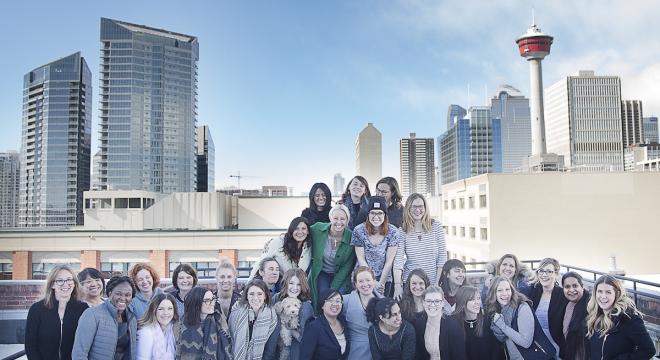March 8, 2017
Today is International Women’s Day and we are being called on to #BeBoldForChange. Why, you might ask, is a middle-aged, white male CEO writing about International Women’s Day? The truth is that I believe I am part of the problem, and I’m determined to do something about it.
Here is a startling stat that might explain why I’m writing this piece. According to 2017 U.S. data, only 23% of senior management positions are held by women, even though they make up 47% of the labor market. And lest someone think I’m on a soapbox trying to sound superior; in our little company of 340 people, we are not doing much better.
Although 44% of our people are female (it was 51% a couple of months ago), they only hold 28% of leadership positions. We're not exactly modelling the behavior we would like to see in the world!
These statistics, and a host of related ones, are more than a little troubling. As the founder and leader of Benevity — a software social enterprise aimed at infusing a culture of “Goodness” into the world — I feel all the more compelled to not only speak out, but to take action.
The benefits of having more women thriving in business are unequivocal. Data shows that companies with more women in senior management have a 35% higher Return on Equity and a 34% higher Total Shareholder Return.
Some of the causal elements of the gender gap in the workforce are perhaps less obvious, both to observe and address. Let’s look at the much lauded Canadian maternity leave policies as an example…
Canada is seen as having a supportive parental leave policy with the government paying up to 55% of the parent’s average weekly wage (to a cap) for a maximum of 35 weeks, while legislation guarantees their job for a full 52 weeks after birth.
This approach is the envy of many from other countries, but is it really helping women in the workforce? While there are now (happily for society) many variations on people having children, in the conventional paradigm the hunter/gatherer hubby is “business as usual” while the caretaker mother stays at home with the baby. Mom’s eventual return to work is often difficult.
Not only is it emotionally tough to leave the baby with someone else, she’s also likely struggling with limited and expensive child care options which frequently leads to either part-time work or a decision to subordinate her career to child care. If she does return full-time, she’s likely dealing with lingering but outdated perceptions that she’s less committed in her work and the work environment itself has likely changed dramatically in the year since she left.
Referred to by researchers as “the motherhood penalty and fatherhood bonus,” this traditional paradigm has led to women receiving fewer raises and promotions and, ultimately, advancing through companies more slowly than their male counterparts.
A year is a long time to be disconnected from your working environment, but stats show it’s terrific for the child. Wouldn’t it be equally good — or perhaps even better — if the parental leave was shared between spouses, and the mother’s role at home and in the workplace could be more equal?
Few companies offer any kind of paid time off for fathers. That’s where we have a great opportunity to create bold change.
As a small step in the right direction, at Benevity we recently developed a parental leave program with the goal of fostering greater social change for both parents in the workplace.
We launched a program that enables more women to develop their careers and prosper while encouraging more fathers to get involved in early childcare — because when society can consider fathers equal parents, it can consider women equal workers. We addressed this by offering new parents (regardless of gender) two weeks paid leave, adding a top-up (up to 100% of salary) for parents on extended leave so they are more likely to return to Benevity, and finally by providing a “bonding bonus” of one month’s salary for parents who choose to share parental leave with their partner.
Re-imagining Benevity’s parental leave program is our most recent action in the campaign to #BeBoldForChange. As purveyors of corporate Goodness, this International Women’s Day, we have also helped our corporate clients and our people support women worldwide through charitable giving and volunteering opportunities.
Despite the attention being paid to these issues, the World Economic Forum predicts the gender gap won't close entirely until 2186. We want to create more gender diverse and inclusive workplaces so that everyone can positively contribute to the future of our economy and society in a balanced, equitable and choice-driven way.
To truly make a difference, we need more companies, more leaders, and more men and women to be a part of this movement.
So, I challenge my fellow 77% male senior leaders to ask yourselves what you can be doing to be part of the solution, and to model the change you want to see in the world. There are quite simply no alternative facts on this topic.
This International Women’s Day, a number of Benevity’s Fortune 1000 clients across North America are running Goodness programs that include giving and volunteering opportunities with local, national and global nonprofits to encourage everyone to support women at work, women in tech, and women around the world, recognizing that different challenges arise around the globe. You, too, can contribute to these initiatives from our Community Impact Portal.

